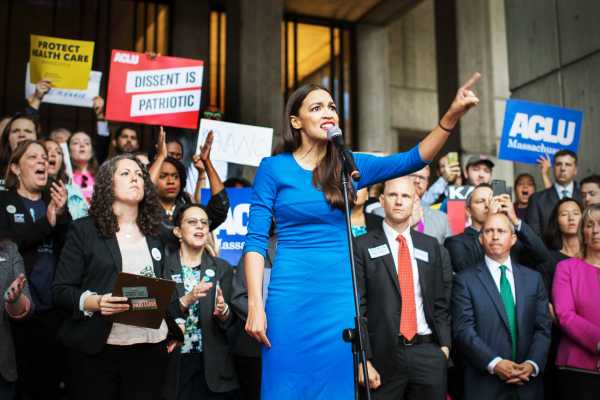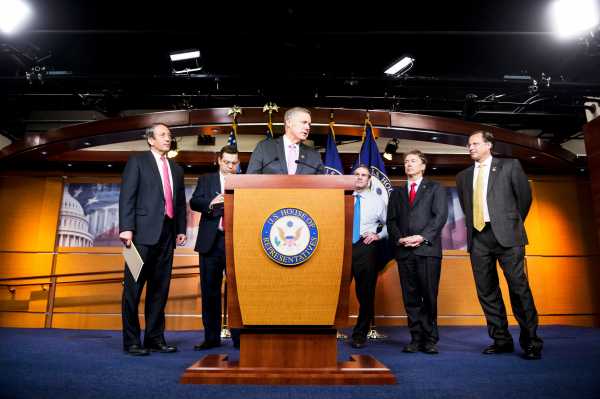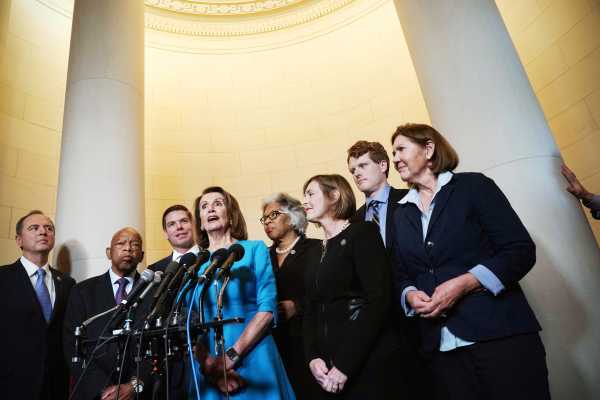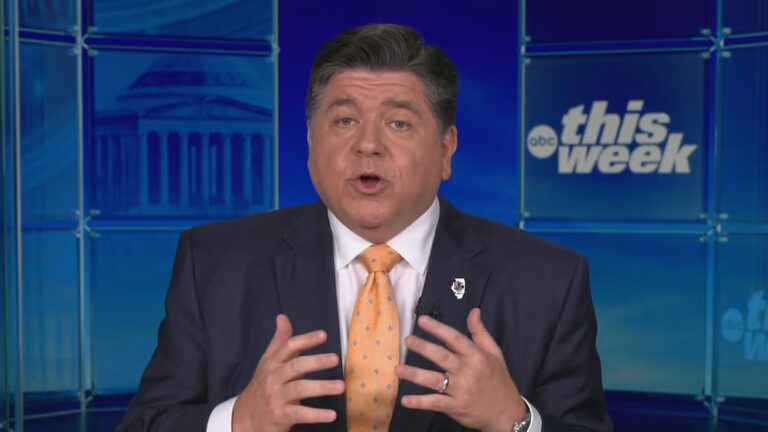
When Alexandria Ocasio-Cortez, a self-proclaimed democratic socialist, ousted Rep. Joe Crowley — the Democratic Party boss widely seen as Nancy Pelosi’s heir apparent — in New York’s 14th District, it was an early sign that a new wave of progressive energy would be upending the status quo in Washington.
“I like to think that I’m persuasive,” Ocasio-Cortez told Jacobin’s Daniel Denvir on a July podcast. “So I usually am able to make the pragmatic case for doing really ambitious things.”
So far, Ocasio-Cortez has already joined a group of environmental activists staging a sit-in in Pelosi’s office, demanding House Democrats sign onto a green infrastructure plan. Activists urged her to withhold her support for Pelosi’s speakership in exchange for concessions on the climate policy. But she supported Pelosi anyways, saying the California Democrat was the most liberal choice.
The energy on the left — tired of Washington’s slow, incremental change — is pushing progressive lawmakers to make a choice: Will they be a thorn in the side of their own leadership after Democrats have finally clawed their way back to power, or fall in line, in the interest of Democrats’ united fight against Trump?
Advocates for the former might be taking inspiration from progressives’ most hardcore ideological adversaries: the Freedom Caucus — a small but mighty group of unified super-conservatives in the House that have used their voting power to push Republicans further and further right.
This summer, Ocasio-Cortez openly floated a Freedom Caucus-style group for the left.
“The thing that gives the caucus power is that you can operate as a bloc vote in order to get things done,” Ocasio-Cortez told Denvir. “Even if you can carve out a sub-portion, a sub-caucus of the progressive caucus, even if you could carve out that, even a smaller bloc, but one that operates as a bloc, then you could generate real power.”

Rep. Pramila Jayapal (D-WA), the new co-chair of the caucus and a leading progressive voice in the House, says the Democratic base is ready for the fight: “Many of these folks are on board with a bold agenda, and they want Democrats to stand up for what they believe in.”
The Freedom Caucus changed things for Republicans
Republican leaders have had to pay attention to the Freedom Caucus.
This group of the most conservative Tea Party-sympathetic House Republicans has never held a majority among House Republicans. But for the past two years, the group’s leader, Freedom Caucus Chair Mark Meadows (R-NC) has known he has enough votes to stop any Republican-led legislation in its tracks. It’s their greatest power, Meadows says: “the ability to vote together.”
Anytime Republican Speaker Paul Ryan has wanted to move legislation with only Republican votes, he’s had to kowtow to their demands. Meadow’s chief principle is that anytime Republicans don’t have the votes, “negotiations aren’t totally over,” he says.
The Freedom Caucus was formed in January 2015 as a principled conservative outgrowth of the Republican Study Committee — a much larger caucus of 172 conservative House members.
By June 2015, the group had staged an act of rebellion against Republican leadership — 34 of them voted against giving then-President Barack Obama more authority to negotiate a Pacific trade deal — that put Meadows’s congressional standing on the line.

It was Meadows who moved to oust House Speaker John Boehner from his seat in 2015. It was the Freedom Caucus that blocked Rep. Kevin McCarthy from replacing Boehner. And the Freedom Caucus has been at the center of every GOP fight, from health care to agricultural subsidies, moving the debate further and further right.
The House didn’t vote on an Obamacare repeal bill until the Freedom Caucus put its stamp of approval on a more conservative proposal that allowed states to waive certain protections for people with preexisting conditions and essential health benefits. A year later, the same group wouldn’t vote for the farm bill unless leadership first agreed to vote on a hardline immigration bill that would have effectively cut legal immigration to the United States by half. Neither bill — Obamacare repeal, or immigration reform — went anywhere.
“The Freedom Caucus was very successful in certainly shaping the legislative agenda of their party, forcing votes on things and also blocking things,” Matthew Green, a political scientist with Catholic University with a forthcoming book about the Freedom Caucus, said.
“If you measure success in terms of forcing the party to discuss and debate things they didn’t want to, then yes I would say successful. If you say success is changing who the speaker of the House is, then yes, successful.”
The Progressive Caucus has a chance to flex their muscle in a Democratic House
The Progressive Caucus actually predates the Freedom Caucus. It was founded in 1991 by a group of members including progressive icon Sen. Bernie Sanders, when he was still a member of the US House.

In its early years, the caucus focused largely on economic equality and workers rights (a key Sanders message today), especially during the years Republican Speaker Newt Gingrich presided over the House. It also became known for its anti-war members opposing the Iraq and Afghanistan wars during the Bush years.
During the Obama administration, progressives tried to push the president’s signature legislative achievement — the Affordable Care Act — to the left by including a public option in the bill. Even though Pelosi shared this commitment, progressives ultimately conceded to the will of moderate Democratic senators who threatened to filibuster the ACA unless the public option was removed. It ultimately remained out of the final bill.
While the caucus has remained a symbolic voice of the left in the House, it’s struggled to drive policy. Earlier this year, amid public outrage over the family separation policy, Jayapal and co-chair Rep. Mark Pocan (D-WI) took the lead proposing an immigration bill, that, among other things, would have abolished Immigration and Customs Enforcement (ICE).

The bill, which answered the activist community’s calls for Congress to defy the Trump administration during the height of the family separation crisis, quickly turned into a political nightmare for Democrats.
Abolish ICE is unpopular and controversial even within the wider Democratic Party. Progressives hadn’t consulted with members of other key immigration-focused caucuses before unveiling their proposals. And when Republican leaders said they’d bring the bill to the floor to force Democrats into a difficult vote, even the progressives who proposed the bill promised to vote against it.
Since, the Progressive Caucus has, in some ways, become the victim of its own success. It’s big — it will be around 90 members in 2019, according to its leaders. It’s so large that the group no longer has a cohesive ideological platform. It includes both Rep. Frank Pallone (D-NJ), who does not support Democrats’ single-payer health care bill, and Jayapal, the leader of the House Medicare-for-all caucus. Many members take campaign donations from corporate PACs. And there are members like Rep. Joe Kennedy (D-MA) who is more conservative than some Republicans when it comes to legalizing marijuana.
Some members are also arguably coopted from taking stronger stances by their own closeness to Pelosi.
Rep. Ro Khanna (D-CA), one of the fiercest advocates for a $15 minimum wage and Medicare-for-all, is reluctant to play hardball with his vote.
“Look, I have a personal friendship with her and respect for [Pelosi], so I would never approach her in a sense of contingency, that’s not the relationship I have,” Khanna told Vox recently. “What I would say to her is, ‘Nancy, others in the progressive caucus feel strongly about that, and if you want to solidify your base — not with me, but with the rest of the caucus — you really should embrace these positions.”
Would acting like the Freedom Caucus actually be effective?
For as many conservatives that argue that the Freedom Caucus has successfully moved the party to the right, more Republicans in Washington decry their tactics as ideological to the point of obstructionist.
Their refusal to compromise has denied Republicans many of the grand bargains of Washington, from health care reform to even deficit control.
“You could make the argument that we have had less conservative pieces of legislation because of the Freedom Caucus,” Brian Walsh, a partner at the public affairs firm Rokk Solutions and former National Republican Senatorial Committee communications director, said last year. “I believe the Freedom Caucus has been Nancy Pelosi’s greatest asset.”

After a shellacking in the 2018 midterms, Walsh’s sentiment has found vocal allies in the House. Most recently, Rep. Ryan Costello (R-PA), who decided not to run for reelection in a district that flipped blue in November, said the Freedom Caucus is constantly “negotiating themselves out of a deal,” he told Politico after the House’s failed Republican-led immigration debate.
Costello also blamed the Freedom Caucus for opening the Republican party to Democratic attacks on health care, by forcing the House to vote on a more conservative — and politically costly — Obamacare repeal bill.
And for a group so adamant on using their leverage to deliver more conservative results, they haven’t seen many policy wins.
Their proposals for sweeping changes to welfare programs have gone nowhere. Repealing Obamacare hit a dead-end. Immigration, too. And even their minor victories, like being in part responsible for killing the border adjustment tax — one of Republicans’ few ideas to pay for massive tax cuts — has so far only contributed to ballooning the deficit.
It’s a reality that gives progressives some pause.
“The question comes up often: are we the Tea Party on the left? The difference is the Tea Party liked to say no; we like to say yes,” Pocan said.
A new progressive movement might be ready for a Freedom Caucus-style movement
A new generation of activists on the left, inspired by Bernie Sanders’s 2016 campaign, remain wary of the Democratic establishment. They see the Obama-era incrementalist style of policymaking as a failure, and balk at the continued influence of big-dollar donors at the top of the Democratic Party. Ocasio-Cortez, a former Sanders campaign staffer, built a campaign on those concerns.
Now in Congress, she, along with the dozens of other progressives who ran — and won — on similar messages, will have to negotiate changing the system.
They’re faced with a choice: unify progressives within the caucus, or stand behind the party.

Pocan wants lawmakers to be open to big tax hikes for the ultra-rich, new taxes on big financial transactions, and new regulation of corporations. Democratic leadership has long paid lip service to these ideals, but has been reluctant to give them the positions of power to execute the agenda.
So far, the Progressive Caucus has taken the approach of negotiating with Pelosi to get more progressives on key committees including Ways and Means, Energy and Commerce, Appropriations, Financial Services and Intelligence, working within the system the progressive base has grown to distrust.
“I’ll be honest, we haven’t thought strategically — the progressive caucus hasn’t leveraged it’s power strategically before,” Jayapal told reporters last week. “So we are in the process of doing that and helping people to get there.”
Even Ocasio-Cortez indicates she’s more interested in working together than being a pain in Pelosi’s side: “As unapologetic and strong as I am in my messaging and my beliefs, my style is that I’m a consensus-builder,” she said in that Jacobin interview.
Standing in Pelosi’s office, thanking climate change protesters for throwing their bodies behind their beliefs, was an Ocasio-Cortez who reflects the voice of the grassroots progressive energy that’s taken over the country. How that translates in the months ahead will be the biggest test of the progressive movement in Congress.
Sourse: vox.com






